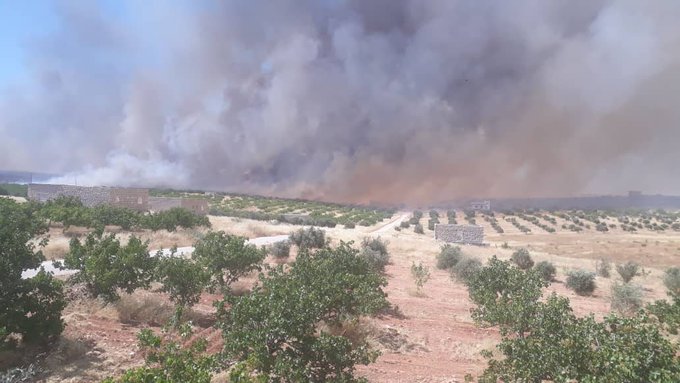
'Before his land was seized by forces loyal to the Syrian régime, pistachio and olive farmer Abu Jaber said he had a story to tell for every grain of sand.
His farmland was near the northern town of Kafr Zita, which was among those captured during an aggressive offensive to reclaim territory in the northern provinces of Hama and Idlib last year.
Almost a year later, much of the agricultural land in the area has either been plundered or burned.
“Years of work have gone to waste,” said Mr Jaber. “I had to leave and will never be able to return back after the crops were stolen and land burnt.”
“Every day I receive dozens of photos and videos … They burn our lands so we can’t return to cultivate for even just ourselves to live off the produce.”
Together with his six brothers, Mr Jaber grew enough food across 450 acres to feed 79 members of the family, as well as providing enough funds to keep them going. They say they have lost crops worth $250,000.
The family have now fled to Batbo in western Aleppo, where they are looking for jobs. Mr Jaber’s sons risk dropping out of university as he can no longer afford to keep them there, and finding work in a country ravaged by almost a decade of civil war is no easy feat.
Syrians are also contending with a collapsing economy and sharp fall in the value of their currency, compounded by the spread of the global coronavirus pandemic.
According to a Facebook statement by the local branch of President Bashar Al Assad's ruling Baath Party in Mahrada, northern Hama, proceeds from this year’s pistachio crop will be put towards a fund to assist the families of the régime forces' dead. Yet there is no system to compensate the farmers for the loss of their land or their income.
According to Abdulnasser Hoshan, a lawyer from Kafr Zita, the proceeds from seized crops were likely to go to intelligence services officers rather than the “martyrs” fund.
“The number of civilians affected is more than 50,000,” said Mr Hoshan.
“It is not currently possible for civilians to claim compensation for their losses because the Assad régime’s judiciary is corrupt, and rights cannot be restored to its people.”
This year’s fires began appearing at the beginning of June and were started by volunteers for state-funded militias. Mr Hoshan said that between 9,000 and 15,000 acres of land that hosted various crops, including pistachios, olives, wheat and lentils, have so far been burned.
“These crimes must be documented for justice after the fall of the Syrian régime,” said Mr Hosham.
Attacking crops in opposition-affiliated areas is a tactic the régime has used before, notably in 2018 and 2019 when huge areas of barley were incinerated. Critics say the attacks are designed to starve civilians, and the loss of food and income makes life very difficult, especially during the hot summer months.
Extremist group ISIS also chose to burn crops in areas they retreated from or where they had recently been defeated.
Idlib is the last rebel stronghold in Syria, with around half of the three million population having already been displaced at least once from other parts of Syria. Food and shelter is already scarce, with even the displacement camps are too full to take people.
Mr Ghassan Aboud, engineer and head of Hama’s opposition agriculture department, said the burning of the fields could also impact the area’s chances of recovery.
As well as killing the soil’s micro-organisms and exposing it to the damaging effects of the sun, the fires damage the ecosystem by killing the insects needed for pollination.
“In the short term, pistachio trees are irreparable agricultural wealth because they need 12 to 15 years to enter the fruit phase,” said Mr Aboud, with olive trees needing between four and five years.
For Mr Jaber, the future of his farm or his family’s whereabouts now seem uncertain.
"I’m afraid that the Assad régime will transfer ownership of the land to another person, as he did with many displaced civilians from the rest of Syria,” he said.
“I’m also afraid of being displaced again from Batabo – the news is spreading that Assad and Russia’s are planning to launch a new military campaign in the region." '

No comments:
Post a Comment